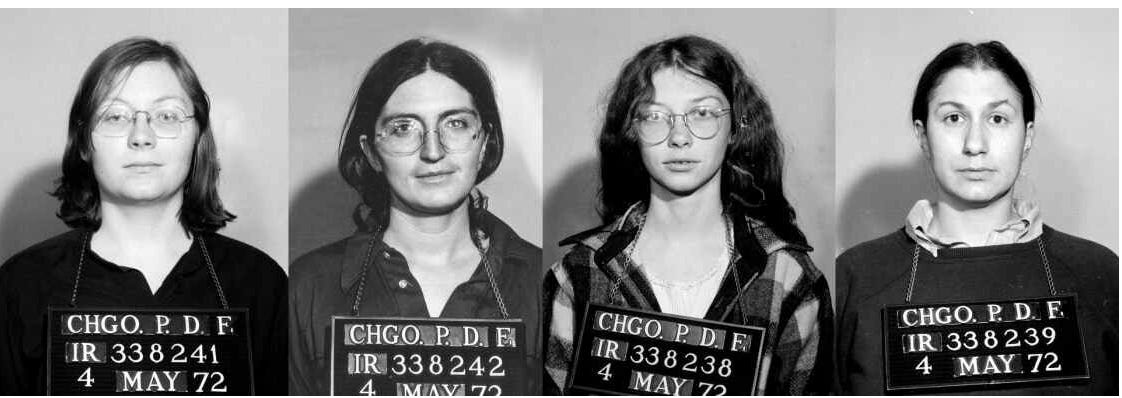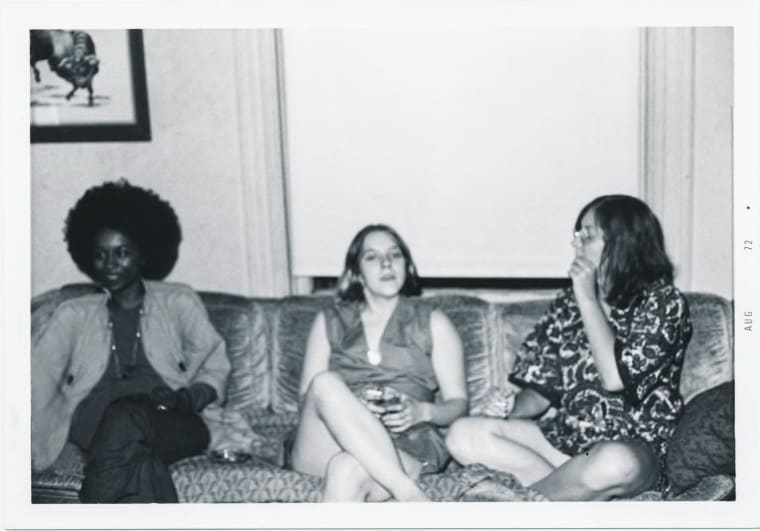Members of the underground network known as Jane.Courtesy HBO
In 1996, I was pregnant and needed an abortion in Egypt, one of the most restrictive countries in the world where the procedure is banned under all circumstances. My then boyfriend asked for help from his cousin, whose girlfriend had had an abortion a few years earlier, and we got the name of the OB/GYN who performed it.
We went to the clinic together, where I stared at the empty waiting room’s aquarium that I will never forget until the doctor was ready to see us. I wondered if the receptionist knew why we were there and I tried not to guess what she thought of me.
“I can do it right now! Pay the 400 pounds (approx. $107) now and I can abort you right now. The operating room is right next door. It won’t take long,” the (male) doctor told me soon after my boyfriend and I went in to see him. I told him I preferred to come in the next day. We returned the next day, I paid the 400 pounds and had a safe and “illegal” abortion,
For breaking the law in Egypt, I could have been sent to prison for six months to three years. The doctor could have faced three to 15 years in prison. My boyfriend and his cousin could have faced prison time too for helping me get an abortion. I gladly shared the doctor’s info with a friend of mine when, a few months after my abortion, she needed to end an unwanted pregnancy, and for that I could have faced more jail time for helping someone get an abortion.
When abortion is “illegal,” it does not make it rare nor eradicate it. It makes it dangerous and often deadly for the poorest and most vulnerable people who can get pregnant. My friend and I could afford the doctor’s fee for getting a safe, “illegal” abortion on demand. Countless other women in Egypt can’t afford one and pay instead for an unsafe abortion with their health or life.
I use inverted commas because I reject the State’s attempt to control my uterus. I reject its power to declare what is “legal” or “illegal” when it comes to my abortions.
Exactly such a disregard for laws that deny us bodily autonomy serves as the modus operandi of an underground network of women who used the codename Jane to provide safe, “illegal,” and affordable abortions in Chicago before the Supreme Court passed Roe v Wade in January, 1973. A film about the collective, called The Janes, will premiere on HBO and begin streaming on HBO Max at 9 p.m. ET Wednesday.
“There was a philosophical obligation on our part. on somebody’s part, to disrespect a law that disrespected women,” a member of the network called Jody said in the film.
My friend and I could afford the doctor’s fee for getting a safe, “illegal” abortion on demand. Countless other women in Egypt can’t afford one and pay instead for an unsafe abortion with their health or life.
Four years after my “illegal” abortion in Egypt, I had a “legal” abortion in the U.S., where the Supreme Court now stands poised to overturn Roe v Wade, thus ending the federal protection of abortion. The State–and the Supreme Court–can fuck off with its opinions about what I can and can’t do with my uterus. That control belongs to me.
A Supreme Court stacked with religious zealots tasked with doing the bidding of right-wing conservatives who have worked for the past 50 years for this moment, deserves no respect. White supremacist Christian zealots, busy building a theocracy, who have used democracy to cut democracy at its knees by destroying abortion rights–a right that most Amerians support–deserve no respect.
“I learned that sometimes you have to stand up to illegitimate authority and sometimes there are unjust laws that need to be challenged,” Heather Booth, of Jane, says in the film.
Read that again and repeat it three times!
“There was a philosophical obligation on our part. on somebody’s part, to disrespect a law that disrespected women”
The Jane network provided abortion to an estimated 11,000 women, despite and inspite of a trifecta of hefty “illegitimate authority”: “the Illinois state legislature that outlawed abortion, the Catholic Church that condemned it, and the Chicago Mob that was profiting from it.”
As the attorney husband of one of the Janes points out, the collective’s clandestine work was left largely alone most likely because the wives, daughters, and mistresses of the police–and even a policewoman herself–were turning to the Jane network for abortion.
It is telling to see when law enforcement was sent after the women.
Members of The Janes in 1972.Courtesy HBO
Two women went to the police in Chicago, saying their sister-in-law was going to get an abortion and they pressed the police to stop her from “committing a sin.” Enter the Irish Catholic patriarchy’s enforcers: as one of the homicide detectives who carried out the sting on the women from Jane described it, just about everyone in the Chicago police department who mulled over the raid was an Irish Catholic.
Seven women from Jane were charged with conspiracy to commit abortion for which they faced up to 110 years each in prison. Their lawyer, knowing that Roe v Wade was before the Supreme Court, stalled the trial. The Supreme Court’s decision that made abortion legal dismissed their charges.
It is not the job of the police or the law to stop a “sin.” But white Christian zealots in the U.S., with the backing of the Supreme Court, have put the law into service for their theocracy.
It is as if they were competing in the Zealotry Olympics. On May 26, even as the Supreme Court had yet to issue its decision on Roe v Wade, the governor of Oklahoma signed into law the strictest abortion ban in the country, making the state the first in the nation to effectively end availability of the procedure. The law, as in Egypt, prohibits all abortions with few exceptions.
To watch The Janes a little over a week later, will viewers in the U.S. understand that the past is not a foreign country but instead destination as ambition when theocrats are driving?
“I learned that sometimes you have to stand up to illegitimate authority and sometimes there are unjust laws that need to be challenged”
In September 2010 I taught a course on gender and new media in the Middle East, at the University of Oklahoma. We had watched the Lebanese film “Caramel,” directed by and starring Nadine Labaki, as the owner of a Beirut hair salon whose friends and coworkers portray a cross-section of Lebanese female experience.
One friend undergoes hymen reconstruction just before her wedding to a man she fears will reject her if he finds out she isn’t a virgin. At first some of the students said they were horrified that virginity was such a “big deal.” I reminded them that until quite recently, it was a “big deal” in the U.S. too. And then one woman raised her hand and upended us all.:
“I just want everyone to know that I signed a purity pledge with my father,” she said.
This was in 2010. Virginity wasn’t just over there in Lebanon. It was right in class with us. Oklahoma kept doing that to me. I joke that going there was like going to the Middle East: a similar mix of zealotry and conservative politics.
Oklahoma was the only state in which every county was red after the 2008 presidential election. And here it is again, brazen once more in its extremism.
The day Oklahoma became the first state in the U.S. to effectively outlaw abortion, I arrived in Ireland to speak at a literature festival. If Oklahoma reminded me of the Middle East, not only suffocating in but relishing its patriarchal laws and politics, Ireland was clear-eyed–not in denial–about the dangers of theocracy.
Over the past seven years, the Irish people have staged not one but two revolutions against Catholic theocracy, successfully passing by popular referenda marriage equality in 2015 and in 2018 a repeal of the Eighth Amendment of the constitution, which had effectively banned abortion, and had resulted in a stream of women who could afford it, making their way to England every year to get a procedure they were denied in their own country.
The abortion rights campaign in Ireland owed much of fire to the rage over the death of one such woman denied an abortion in Ireland: Savita Halappanavar, a dentist from India who died in 2012 at age 31 from septicemia—an infection she contracted after doctors in Galway denied her an abortion during a miscarriage.
If Oklahoma reminded me of the Middle East, not only suffocating in but relishing its patriarchal laws and politics, Ireland was clear-eyed–not in denial–about the dangers of theocracy.
Abortion bans are deadly and dangerous. And they filled the septic abortion wards of pre-Roe v Wade America with an endless stream of women. At Chicago’s Cook County hospital, the septic abortion ward admitted 15 to 20 women a day, suffering the consequences of “illegal” abortions gone wrong, an ER doctor told the film The Janes.
As the Supreme Court prepares to wrench the U.S. back to those horrors, take the challenge of Jody of the Jane collective and oblige yourself to disrespect a law that disrespects women.
As white Christian theocrats prepare to destroy a right that most people in the U.S. support, accept the challenge of Heather Booth and ask yourself how you will stand up to illegitimate authority and how you will challenge unjust laws.
I know what it’s like to have an “illegal” abortion and I know how different a “legal” one is. I straddle a surreal "before" and "after” that is about to go into effect but in reverse in the U.S. Watch The Janes and take notes on how to defy, disobey, and disrupt the theocracy’s stranglehold over pregnant bodies.
Watch The Janes and insist on making the zealots fear your rage.
Mona Eltahawy is a feminist author, commentator and disruptor of patriarchy. She is editing an anthology on menopause called Bloody Hell! And Other Stories: Adventures in Menopause from Across the Personal and Political Spectrum. Her first book Headscarves and Hymens: Why the Middle East Needs a Sexual Revolution (2015) targeted patriarchy in the Middle East and North Africa and her second The Seven Necessary Sins For Women and Girls (2019) took her disruption worldwide. It is now available in Ireland and the UK. Her commentary has appeared in media around the world and she makes video essays and writes a newsletter as FEMINIST GIANT.
FEMINIST GIANT Newsletter will always be free because I want it to be accessible to all. If you choose a paid subscriptions - thank you! I appreciate your support. If you like this piece and you want to further support my writing, you can like/comment below, forward this article to others, get a paid subscription if you don’t already have one or send a gift subscription to someone else today.




